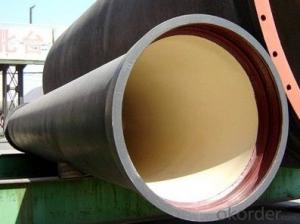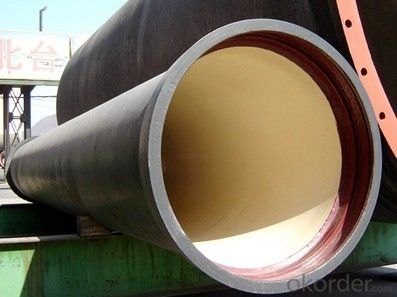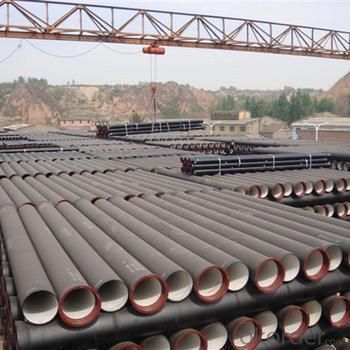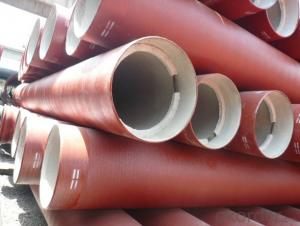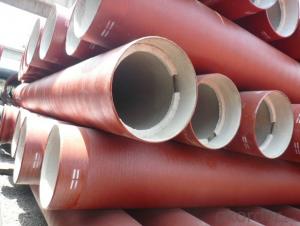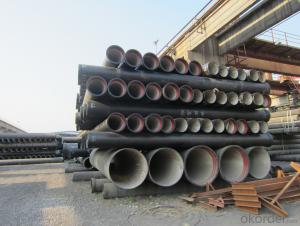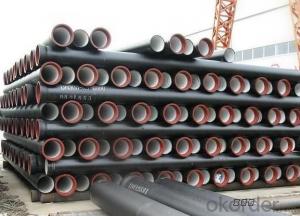Ductile Iron Pipe DN80-DN400 EN545/EN598/ISO2531 For Waste Water
- Loading Port:
- China main port
- Payment Terms:
- TT or LC
- Min Order Qty:
- 28 m.t.
- Supply Capability:
- 200000 m.t./month
OKorder Service Pledge
OKorder Financial Service
You Might Also Like
1,Ductile Iron Pipe Description :
1) Pipes confirm to ISO2531,K9 class,T type joint,6m long,with inside cements lining conform to ISO4179, outside Zinc spraying(130g/m2) and bitumen coating(70μm) conform to ISO8179.
2) Pipe ends: Spigot and socket ends, with 100% SBR rubber gaskets accoding to ISO4633
3) we can do third party inspection according to customer's request.
2,Main Features of the Ductile Iron Pipe:
1).Quality guarantee
• Chemical checking
• NDE after rough machining
• Mechanical testing after heat treatment
• Final NDE,dimension inspected
2).Quality document
• Full Q.A document as per client request
3).Packing and Shipping
• standard export package(carton/wooden case/pallet)
• accept FOB,FAS,CNF,CIF door to door etc or customer designated shipping agent
4)Inspection
• In-house Foundry
• Third party inspection available upon requirement
3,Ductile Iron Pipe Images:
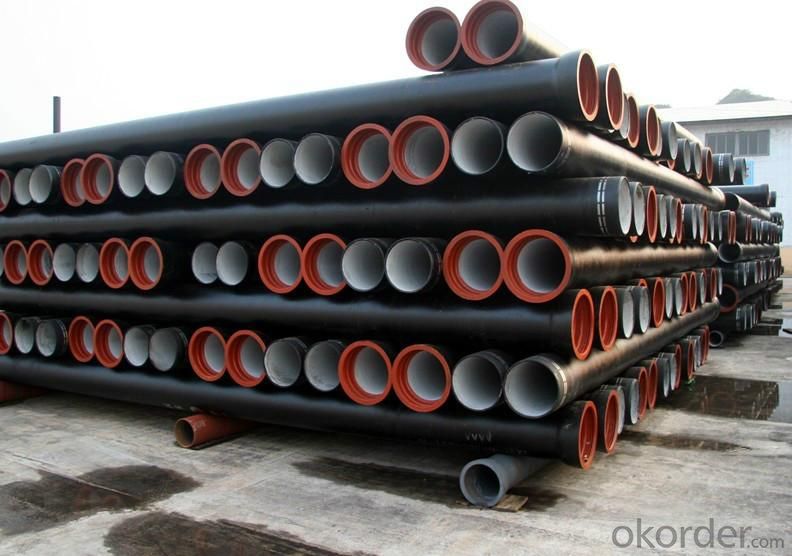
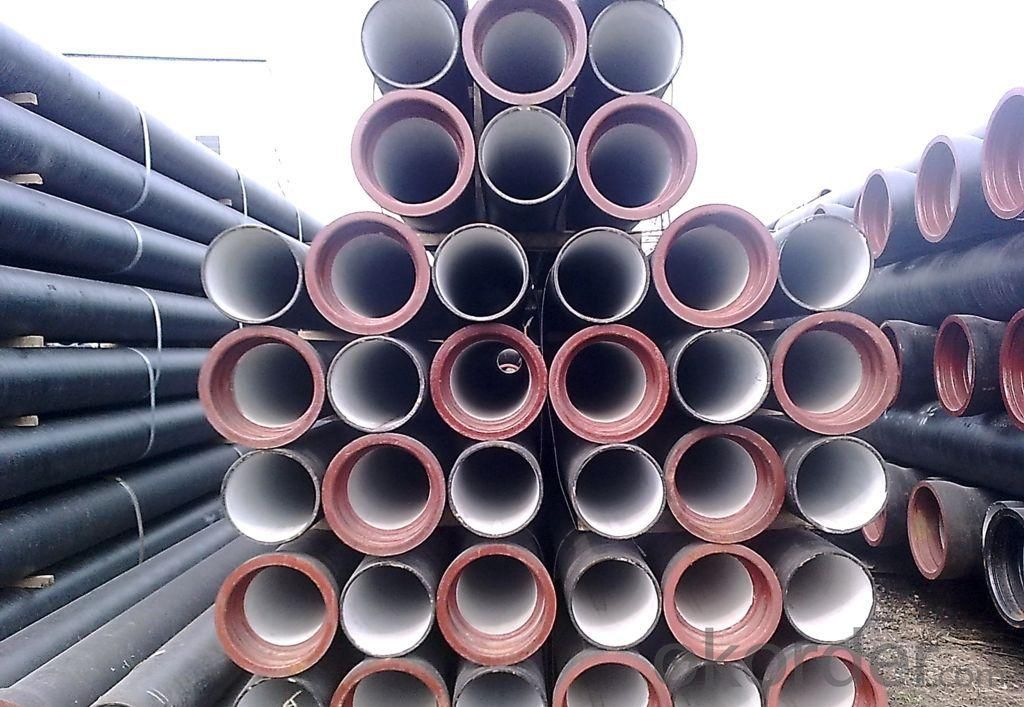
4. Ductile Iron Pipe Specification:
Internal lining: ductile iron pipes shall have an internal cement mortar lining in acc with ISO4179.
External coating: ductile iron pipes shall be externally coated with metallic zinc spray plus a further layer of resin painting to ISO8179.
Gasket: 100% SBR/NBR/EPDM rubber gasket in accordance with ISO4633.
Packing: ductile iron pipes from DN100 to DN300 be bundled with steel belts, others are in bulk.
Payment term: L/C, T/T.
5.FAQ:
We have organized several common questions for our clients,may help you sincerely:
1.Q: Why would you choose ductile iron pipe rather than other pipe materials?
A:The reasons are obvious for that not only ductile iron pipe possesses the inherent strength and flexibility of ductile iron, combined with proven corrosion protection systems, but also the cost savings can be achieved from design to installation and commissioning.
2.Q:Why can you guarantee the inner of pipes can’t be corroded?
A: High alumina cement mortar lining and sulphate-resistant cement mortar lining. These two special linings are applicable to inner anti-corrosion for sewage pipes, improving resistance to erosion of the sewage components.
- Q: Can ductile iron pipe be used for both water and sewage applications?
- Yes, ductile iron pipe can be used for both water and sewage applications. Ductile iron pipe is known for its strength, durability, and corrosion resistance, making it suitable for a wide range of applications, including conveying both water and sewage. Its high tensile strength allows it to withstand the high pressure and heavy loads associated with water and sewage systems. Additionally, ductile iron pipe has a smooth interior surface that helps to minimize friction and improve flow efficiency, making it ideal for transporting both water and sewage. The material's resistance to corrosion and chemical attack ensures a long service life, even in harsh environments. Furthermore, ductile iron pipe is available in a variety of sizes and configurations, allowing it to be customized to meet the specific requirements of water and sewage applications. Overall, ductile iron pipe is a reliable and versatile choice for both water and sewage conveyance.
- Q: How can the ductile iron pipes be treated with corrosion protection?
- Epoxy coal tar coatingThe epoxy coal tar coating is not only suitable for gas pipelines, but also for sewage pipes. It is a two component coating with a high adhesion and a very smooth surface
- Q: Are ductile iron pipes suitable for use in mining tailings pipelines?
- Yes, ductile iron pipes are suitable for use in mining tailings pipelines. Ductile iron has excellent strength and durability properties, making it capable of withstanding the high pressure and abrasive nature of tailings. Furthermore, its corrosion resistance and ability to withstand harsh environmental conditions make it a reliable choice for mining applications.
- Q: How does ductile iron pipe perform in high-velocity flow conditions?
- The performance of ductile iron pipe is exceptional in conditions with high-velocity flow. It can endure the forces exerted by these flows without experiencing significant damage or failure, thanks to its unique properties like high tensile strength and impact resistance. One advantage of ductile iron pipe is its ability to withstand water hammer, which is a sudden increase in pressure caused by the rapid deceleration or change in direction of water flow. This is particularly crucial in high-velocity flow conditions, where water velocity is significantly higher than normal. Ductile iron pipes are designed to absorb and dissipate the energy generated by water hammer, protecting the pipe and the surrounding infrastructure. Moreover, ductile iron pipe has excellent flow characteristics, ensuring smooth and efficient water transport even at high velocities. This is especially important in applications that require quick transportation of a large volume of water, such as industrial processes or fire protection systems. The smooth interior surface of ductile iron pipe minimizes friction and pressure losses, allowing water to flow freely and efficiently, reducing energy consumption and operating costs. Furthermore, ductile iron pipe is highly resistant to corrosion, which is a common issue in high-velocity flow conditions where the water may contain aggressive chemicals or particulates. The protective lining and coating systems used in ductile iron pipes create a barrier against corrosion, prolonging the lifespan of the pipe and maintaining its structural integrity. In conclusion, ductile iron pipe is ideal for high-velocity flow conditions due to its ability to withstand water hammer, excellent flow characteristics, and resistance to corrosion. Its strength, durability, and reliable performance make it a preferred choice for various applications, ensuring efficient water transport even in demanding environments.
- Q: What are the different pressure ratings available for ductile iron pipe?
- Ductile iron pipe, known for its strength, durability, and resistance to corrosion, finds widespread use in various applications. The pressure ratings of this type of pipe depend on factors like diameter and wall thickness. Typically, ductile iron pipe offers pressure ratings ranging from 150 psi to 350 psi. For pipes with smaller diameters, usually measuring between 3 inches and 24 inches, commonly available pressure ratings include 150 psi, 200 psi, and 250 psi. These ratings suit a broad range of applications, including water distribution systems, sewer lines, and industrial piping. For larger diameter pipes, typically ranging from 30 inches to 64 inches, the usual pressure ratings are 150 psi, 200 psi, 250 psi, and 350 psi. These higher ratings are necessary for transporting larger volumes of water or other fluids across longer distances. It is worth noting that the pressure ratings of ductile iron pipe adhere to industry standards and guidelines. These standards ensure that the pipe can safely withstand both internal pressure and external loads during operation. When choosing the appropriate pressure rating for ductile iron pipe, it is vital to consider factors such as the specific application, flow rates, and expected operating conditions. Seeking advice from industry experts and adhering to local codes and regulations is crucial to ensure the correct selection and installation of ductile iron pipe for a particular project.
- Q: How are ductile iron pipes protected against root intrusion?
- Ductile iron pipes are protected against root intrusion through various methods and techniques. One commonly used approach is the application of root inhibitors or growth regulators. These chemicals are typically injected into the soil around the pipes, creating a barrier that inhibits root growth near the pipe. This helps prevent roots from penetrating the pipe and causing damage. Another method involves the use of physical barriers such as root barriers or sleeves. These are installed around the pipes to physically block the roots from accessing them. Root barriers are typically made of materials like plastic or metal and are designed to withstand the pressure exerted by growing roots. Additionally, regular maintenance practices such as periodic inspections and cleaning are essential in preventing root intrusion. By monitoring the condition of the pipes and removing any existing root masses, the risk of further root intrusion can be minimized. It is worth noting that preventative measures are more effective than reactive measures when it comes to protecting ductile iron pipes against root intrusion. Therefore, implementing proactive strategies during the installation phase, such as proper pipe bedding and alignment, can help reduce the likelihood of root intrusion in the first place. Overall, a combination of chemical treatments, physical barriers, and appropriate maintenance practices can significantly enhance the protection of ductile iron pipes against root intrusion, ensuring their long-term durability and functionality.
- Q: How does ductile iron pipe perform in areas with high soil corrosivity?
- Ductile iron pipe performs exceptionally well in areas with high soil corrosivity due to its inherent corrosion-resistant properties. The material used in ductile iron pipes is specifically designed to withstand harsh soil conditions, including those with high levels of corrosive elements. One of the main reasons why ductile iron pipe is suitable for areas with high soil corrosivity is its protective coating. Most ductile iron pipes are coated with a layer of cement mortar or a polyethylene sleeve, which acts as a barrier between the soil and the pipe. This coating not only prevents the soil from coming into direct contact with the iron, but it also provides an additional layer of protection against corrosion. Furthermore, ductile iron itself is a highly corrosion-resistant material. It contains a higher percentage of carbon compared to traditional cast iron, which improves its strength and durability. The carbon content also forms a protective layer of graphite within the iron matrix, which acts as a natural barrier against corrosion. In areas with high soil corrosivity, ductile iron pipes have been proven to have a long service life, often exceeding 100 years. This is due to their ability to resist corrosion and maintain structural integrity even in harsh environments. Additionally, ductile iron pipes have a high resistance to external loads and can withstand the stresses associated with high soil corrosivity. Overall, ductile iron pipe is an excellent choice for areas with high soil corrosivity. Its corrosion-resistant properties, combined with protective coatings, ensure that the pipe remains durable and reliable even in the most challenging soil conditions.
- Q: How can stainless steel pipes and ductile iron pipes be joined?
- Or with a gland type expansion joint, by tightening the pressure plate bolts, sealing pipe fittings and pipe wall, so as to achieve sealing, while retractable function
- Q: Are ductile iron pipes resistant to UV radiation?
- No, ductile iron pipes are not resistant to UV radiation. UV radiation can cause degradation and weakening of the material over time. To protect ductile iron pipes from UV radiation, they should be coated or wrapped with a UV-resistant material or painted with a suitable protective coating. Additionally, proper maintenance and regular inspections should be carried out to detect and address any signs of UV damage.
- Q: What is the difference between cast iron pipe and seamless steel pipe and galvanized steel pipe?
- Seamless steel pipe: a pipe with a hollow cross section, used as a conduit for transporting fluids, such as pipelines for transporting petroleum, natural gas, gas, water, and certain solid materials. Compared withsteel and roundsteelinsolid, flexural torsional strength in the same time, the weight is light, is a kind of economic section steel, widely used in the manufacture of structural parts and mechanical parts, such as the oil pipe, automobile transmission shaft, the bicycle frame and steel construction with scaffold with steel pipe manufacturing ring parts can be improved the utilization rate of materials, simplify the manufacturing process, material saving and working hours, has been widely used to manufacture steel tube.
Send your message to us
Ductile Iron Pipe DN80-DN400 EN545/EN598/ISO2531 For Waste Water
- Loading Port:
- China main port
- Payment Terms:
- TT or LC
- Min Order Qty:
- 28 m.t.
- Supply Capability:
- 200000 m.t./month
OKorder Service Pledge
OKorder Financial Service
Similar products
Hot products
Hot Searches
Related keywords
